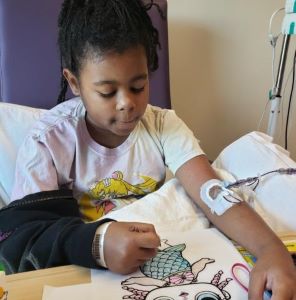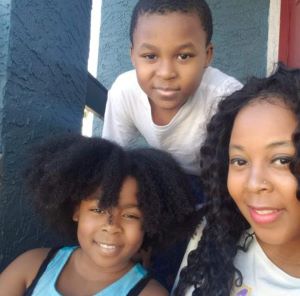Even though Kaliyah is just 11 years old, those close to her are thinking about her adulthood, including her care team at the Center for Cancer and Blood Disorders at Phoenix Children’s. That’s because Kaliyah was born with sickle cell disease, a hereditary, lifelong, chronic blood disease that may cause serious complications as she grows up, including having a greater risk of stroke and organ damage.

Upon learning of Kaliyah’s diagnosis, her mom Keandra said, “It was scary because she was my first baby. What do you do?”
Kaliyah started seeing a hematologist every other month until she was 5 years old, and her sickle cell disease was well managed with medication as she grew.
“She was fairly healthy other than that. She was a very healthy baby and very healthy toddler,” says Keandra.
At age 10, Kaliyah started complaining about pain and had a swollen belly. That’s when her pediatrician referred Kaliyah to Phoenix Children’s for more testing. Kaliyah was found to have Moyamoya syndrome – an uncommon vascular complication of sickle cell disease that puts her at an increased risk of having a stroke.
Her care team at Phoenix Children’s, headed up by hematologist Maa-Ohui Quarmyne, MD, knew they would need to act quickly to help Kaliyah avoid a stroke in the near term. Dr. Quarmyne also knew Kaliyah would need help to preserve her organ health over the long-term as this is a complication that can develop over time with sickle cell disease.

“Kaliyah exemplifies a patient who is doing well on the outside, but what sickle cell disease can do on the inside, that isn’t great,” said Dr. Quarmyne. “My goal as a pediatrician is to take care of kids in a way that gives them optimal health today to live their healthiest adult lives with the best outcomes possible.”
Even though more and more children are conquering and surviving sickle cell disease, they do face challenges in adulthood.
“You treat now to protect and preserve organs so children can have the best quality life and so kids like Kaliyah can grow up to be teachers, doctors, nurses, whatever they want to be, and live a full, long life,” added Dr. Quarmyne.
Kaliyah now comes to the Center for Cancer and Blood Disorders at Phoenix Children’s every four weeks for her hematology check-up with Dr. Quarmyne and to receive a blood transfusion to keep her percentage of sickled cells low.

“It is pretty scary for her – being poked a lot – but I’m thankful because blood donors are saving my baby’s life,” says Keandra.
When asked how she feels about getting transfusions, Kaliyah gives a big Thumbs Up! Mom Keandra says it does help Kaliyah feel better for a couple of weeks or so and they make sure to celebrate completing each transfusion with a treat.
While great strides have been made toward managing sickle cell disease, the only known cure is a bone marrow transplant. Keandra explored this option but unfortunately neither she nor Kaliyah’s 10-year-old brother Keion are a match.
For now, Keandra helps Kaliyah manage the highs and lows of sickle cell disease with the expert help of Dr. Quarmyne and the support of her whole care team at Phoenix Children’s Sickle Cell Program.
“She encourages me every day,” says Keandra of Kaliyah’s strength and resilience. “She has a great team at Phoenix Children’s. She sees Lindsay, a therapist to help her manage her worry and stress. She also has Jake, a social worker who helps us find other resources and support, and we especially appreciate nurse Kelli who is just the best!”
“Children with chronic diseases are living with a challenge that we as parents and clinicians can’t even imagine what they go through – unless you have it too – but I want parents to know that their children can have as full a quality of life as possible, to enjoy the joys of childhood, while still being careful because they have a chronic illness,” shared Dr. Quarmyne. “Our children will grow up stronger and better because their life experiences will teach them. They will grow up as stronger human beings.”

Today Kaliyah is busy with school, her crafting projects, playing the violin and getting ready to attend Camp Rainbow this summer. Her teacher says she’s known as the friendliest person in class and a friend to everyone.
As for advice for other kids and families navigating sickle cell disease, Kaliyah’s mom has these words of wisdom and encouragement, “Stay strong, take everything one day at a time and it will all be okay in the end.”
Growing into a healthy adult is important for Kaliyah because she has aspirations to be a doctor and would one day like to open her very own hospital that treats adults, kids AND animals all under one roof. Sounds like Kaliyah is on to something really cool there and we can’t wait to see what her future holds!

To help create new possibilities for Kaliyah and kids like her who rely on life-saving transfusions and treatment, please donate blood and learn more about joining the bone marrow transplant registry at BeTheMatch.org.
For families seeking help and support, check out this Bright Futures blog on blood disorder diagnoses.
